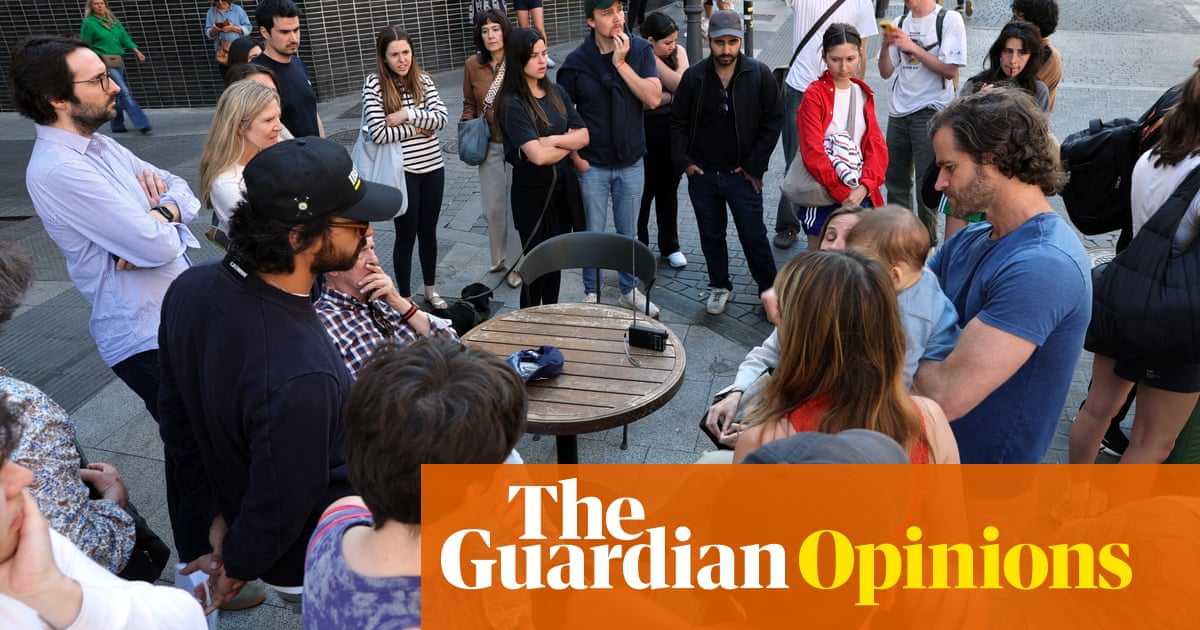At the entrance to a healthcare centre on Trafalgar Street, in my densely populated, central Madrid neighbourhood, somebody had stuck a sign: “We ask for patience and common sense.” The door was half open as doctors and nurses calmly tended to emergencies inside.
Patience and common sense is a very good way to describe what I witnessed in Madrid throughoutthe big blackout. We had no light, no power, no phone signal, not even water in some apartment buildings.
Traffic lights were out across the capital. Police officers and volunteers could direct traffic on only a few of the major avenues, but pedestrians still managed to cross the streets, with most drivers stopping or slowing down of their own accord.
Not every supermarket was open, but many were still selling food in an orderly manner. People shared tips on which stores were accepting credit cards. At a small bazaar in my neighbourhood, customers were asking how many torches were left so others behind them in the queue could also buy one.
Hospitals continued working on backup generators, but non-urgent operations were cancelled. Home care became a major challenge: elderly neighbours had to climb eight or nine flights of stairs in some buildings, mechanical lifts for bedridden patients stopped working and insulin supplies in people’s homes were at risk as fridges lost power.
Madrid’s subway was quickly evacuated, but thousands of passengers were stranded for hours in high-speed trains acrossSpain, never reaching their destinations. Drivers queued for fuel in petrol stations, many unable to pay without cash. Some people walked to get home, while others waited it out in bars and outdoor cafes –luckily the outage struck on a warm spring day.
As I walked through Madrid, I joined crowds gathered around the few available radios. One driver had parked their car, rolled down the windows and had the radio on loud so others could listen. It made a street in my district one of the best places in the city to follow the news. A group of young people took some chairs out. Many listened attentively. People were worried, but there were laughs too and cheers for the communal radio.
At elDiario.es, the Spanish newsroom I work for, breaking news coverage was managed by our teams in the Canary and Balearic Islands, which were unaffected by the outage, and by the deputy editor, who had been sent to Rome to cover the pope’s funeral and the conclave. At around sunset, I finally managed to send a few messages, standing on a street corner in front of a closed bank where the wifi was miraculously still working.
Within about 12 hours, power had been restored to most of Spain, a remarkable turnaround given the severity of the outage. The Iberian blackout showed the resilience of basic services – and for me, the calm with which most people reacted was remarkable.
But this extraordinary event has also exposed our many vulnerabilities in a power-dependent and internet-reliant world. Few had conventional radios, offline phone alternatives, or even emergency supplies. Most of us live in small apartments, so stockpiling is uncommon. Above all, we had little idea of where to go in case of an emergency other than home or work. Civil protection infrastructure and preparedness are not part of our collective thinking.
I recalled the words of Keir Giles, a defence expert, who told me a few weeks ago in relation to the risks of hybrid war and other emergencies in Europe: “The farther west inEuropeyou go, the less idea people have of where they can go for help, support, shelter, food and evacuation in the event of a crisis.”
When the European Commission recently recommended that every household prepare asurvival kit, the typical reaction among Spanish citizens and politicians was laughter and disbelief. The Spanish foreign minister said the kit was a way to “worry citizens needlessly”. Even Spain’s European commissioner, Teresa Ribera, a vice-president of the EU executive, said she was “surprised” by the way the initiative had been introduced.
Spain went through an especially brutal Covid pandemic and has endured several big climate-related emergencies, includingsevere flooding in Valenciajust six months ago. But even after these crises, many Spaniards still view emergencies as things that happen elsewhere, in other parts of Europe, to other people in the world.
The war at the heart of Europe still feels distant, despite copious evidence of hybrid attacks originating in Russia, including the killing of a former Russian pilotwho had defectedto Spain. Europe’s critical infrastructure must be vulnerable in the current geopolitical climate.
It’s still too early to know what caused this historic blackout in the Iberian peninsula. Opposition parties are already attacking the government for supposedly acting too slowly in keeping the public informed or identifying the cause, but this was frankly impossible in such a short timeframe. What is clear is that governments and citizens need to be better prepared for these uncertain and dangerous times. Monday was a jolt; a reminder that civil emergencies don’t just happen to someone else.
María Ramírez is a journalist and deputy managing editor of elDiario.es, a news outlet in Spain
